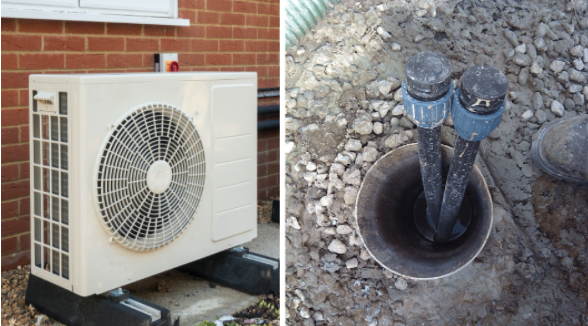
Ground Source VS Air Source Heating
Investing in a renewable energy source such as a heat pump requires thorough research and careful consideration. The most common types of heat pumps are ground source heat pumps and air source heat pumps. As their names suggest, ground source heating extracts energy from the ground and air source heating retrieves energy from the air. Whilst they essentially do the same thing and provide similar solutions, there are a couple of significant differences that may sway you towards one over the other.
Cost
One of the biggest factors most people will consider when making any changes to their property is cost. Although the technology of these two pumps is similar, the difference in price is significant. Typically, installing an air source heat pump will cost between £7,000 – £13,000 and a ground source heat pump £14,000-£19,000.
Although ground source heating comes at a higher cost, financial support is more likely to be available from the government, often covering more than double the cost, compared to air source heating. The current funding, known as the Renewable Heat Incentive, is due to be replaced by the Clean Heat Grant in April 2022 so it is recommended to check your eligibility against the new scheme when considering heat pump installation.
Efficiency
As with most things, lower cost doesn’t always mean better performance. The efficiency of a heat pump is determined by the energy source and how it converts this into heat for your home.
UK temperatures span across an average of -5 and 25 degrees throughout the year. Therefore, an air source heat pump will start off at this temperature and use energy to turn this into heat. In winter, with low and potentially sub zero temperatures, this can require a lot more energy.
The temperature underground is much less varied, typically staying between 10 and 12 degrees. This means that a ground source heat pump doesn’t have to work as hard to reach necessary temperatures.
As you can see, the two systems work at different efficiencies depending on the time of year. Saying this, ground source heating is more efficient overall throughout the year, resulting in a higher fuel saving and lower energy bills.
TO NOTE: Overall cost savings can differ depending on where you live in the country. Ground source heating is a considerably better option if you live further north or in colder parts of the country.
Installation
Installation is one of the biggest differences between ground source and air source heat pumps. Air source heat pump installation is a fairly quick and easy process, involving a unit being fitted to the side of your property with no need for groundwork, this looks like a large fan or air conditioning unit. Some will also have a unit that goes inside of the building too. They can vary in size depending on the heat demand of your home but do not require planning permission. The potential downsides of this installation is that a large unit on the side of your home could take up valuable space if you have a small garden and isn’t particularly aesthetically pleasing. An air source heat pump can also be pretty noisy, something you may need to consider if you have close neighbours.
Ground source heat pumps require more outdoor space but won’t be visible once installed. They can be installed vertically and uses a ground loop to extract and provide heat into the home – this is what takes up the most space! This doesn’t require as much space as a horizontal system and is the longer lasting option. A unit, the size of a large fridge, will need to be fitted inside the building too so bear this in mind when considering if ground source heating is the right choice for your home. Installation of a ground source heat pump can take a couple of weeks and may cause some disruption in terms of workmen and use of space but once finished, won’t be visible and your garden will look as it did prior. Plus, you’ll have a brand new renewable source of heat providing warmth all year round at a low long-term cost!
Both ground source and air source heating are a great addition to any home or business and will effectively provide energy efficient heat into your home all year round. However, the way they’re installed and the requirements for this differ quite vastly. If you’re on a budget and have limited space at your property, air source heating is likely the best, most feasible option for you. Alternatively, if space and finances are not an issue and you want to get the most out of your new renewable energy source, ground source heating comes out on top.
When choosing ground source heating as a renewable energy source for your home or business, Dragon Drilling are the leading UK experts. Get in touch to learn more or receive a quote.
